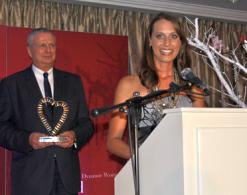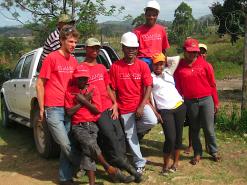
Aids activist gets Clarins award
Angela Larkan, the founder of non-profit organisation Thanda, has been named the Clarins Most Dynamic Woman of the Year for 2011 in recognition of her work to fight the destructive impact of HIV/Aids and poverty on orphans in rural communities. Five years ago, at the age of 22, Larkan established Thanda (isiZulu, meaning “love”), and has […]

Angela Larkan, the founder of non-profit organisation Thanda, has been named the Clarins Most Dynamic Woman of the Year for 2011 in recognition of her work to fight the destructive impact of HIV/Aids and poverty on orphans in rural communities.

Five years ago, at the age of 22, Larkan established Thanda (isiZulu, meaning “love”), and has since pioneered new approaches to fighting HIV/Aids in rural communities and taking care of HIV orphans. This model could be implemented in other African countries.
Today the project supports over 325 children daily, while Larkin strives continually to bring hope to thousands more through her model for community change.
In 2010 Larkan was named the winner of Brand South Africa‘s inaugural Mzansi Soul Awards, which honour people who express the spirit of ubuntu in contributing to a better country for all.
Recognition of her work went international in September 2011, when she was chosen to be featured in Levi’s “Go Forth” campaign, which rallies for positive change in the world by showcasing the work of “pioneering individuals from across the globe who are tackling the greatest challenges of our time”.
The Clarins Most Dynamic Woman of the Year award acknowledges and rewards selfless and dynamic women who are making a difference in the lives of children. The award is given around the world and has been running in South Africa for 10 years.

Nominations are received via national women’s magazines.
Robynne Adams, GM of Clarins South Africa, said: “Angela is making a difference, sowing the seeds of hope, for so many. Thanda empowers people to become problem solvers in their own community, working with existing resources, traditions and structures to ensure solutions are realistic and lasting.”
Keeping the social fabric intact
Not only is Larkan the founder of Thanda, but she also established the Thanda After-School project, which is run from existing buildings such as classrooms, and employs role models from within the community.
Children receive a meal each day, as well as a stable support system that nurtures, guides and mentors them and helps them to break out of the cycle of poverty. They are also encouraged to become active members of the community.
Thanda keeps the rural social fabric intact and embraces the Zulu custom whereby family members, friends and neighbours pitch in to take care of each other, no matter how stretched their resources are.
“I grew up not understanding why some people lived in luxury and some were sleeping on cardboard,” said Larkin. “I remember thinking that somehow humanity had been lost.”
As she grew older, she said, she realised that the Aids epidemic and the thousands of children left without parents as a result, presented a challenge that traditional forms of aid and charity could not address.
“I felt the issue needed to be looked at in a new way, built on the strengths South Africa possesses, its people and its communities.”
Larkin hopes her example will show people that despite the challenge of starting something new or going against what others are doing with their lives, the rewards are priceless.
“When you help a crying child in need, support a grandmother who feels alone, or enable a teenager to have hope, we all feel that lost humanity once again.”
By: MediaClubSouthAfrica.com reporter
Source: www.mediaclubsouthafrica.com
